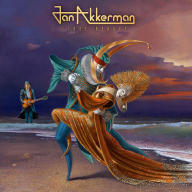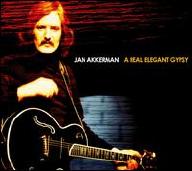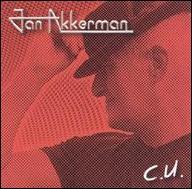Akkerman was born in Amsterdam, Holland, in 1946, into a musical family -- his father played the clarinet and the trumpet, and Akkerman reportedly took up the piano-accordion at age three, which he soon followed with formal lessons. He studied at the Amsterdam Conservatory until he was in his teens and the family moved to Vienna, Austria, by which time the guitar had become his primary instrument. The list of influences on his musical sensibilities ranged from Julian Bream in classical to Elvin Jones in blues. His taste and interests were extraordinarily wide-ranging, from pop/rock to classical, with room for blues, Latin, and other influences. He joined his first band, Johnny the Cellar Rockers, in 1958, at age 11, which included his boyhood friend Pierre van der Linden on drums. Later on, the two were members of the Hunters, an instrumental group whose sound was heavily influenced by that of the Shadows. He acquired a special interest in the lute while on a visit to England during the mid-'60s, during which he saw a performance by legendary classical guitarist Julian Bream, whose repertory of medieval works also fascinated Akkerman. This interest, which broadened to embrace a fixation on medieval England and its countryside, later manifested itself in such works as Elspeth of Nottingham from Focus III.
During the late '60s, Akkerman, van der Linden, bassist Bert Ruiter, and singer Kaz Lux formed Brainbox, who were good enough to get a recording contract with Parlophone Records. He was involved with an early incarnation of the group Focus, founded by conservatory-trained flutist Thijs van Leer, but left after they'd cut an unsuccessful debut album -- then began the personnel shuffle that revived the group in its more successful form. He took van der Linden with him from Brainbox, and also took van Leer and bassist Cyril Havermans (later succeeded by Ruiter) from the original Focus, forming a new group of that name. With Akkerman's virtuoso guitar work and arrangements coupled to van Leer's classical influence (and his yodeling on their breakthrough hit, Hocus Pocus), the new group found a large international audience beginning in 1972, which transformed Akkerman into a superstar guitarist.
His solo career actually dated from 1968, though his attempt at a solo album, later titled Guitar for Sale -- containing his covers of numbers such as What'd I Say, Ode to Billy Joe, and Green Onions -- was so primitive by the standards of the time, it was deemed unreleasable until Akkerman started topping reader surveys in the mid-'70s. Profile, released in 1972 after he'd begun making some headway with his reputation, also dated from 1969 and his days with Brainbox. Akkerman's first real solo album reflecting his music and interests at the time appeared in 1974, in the form of Tabernakel, which was recorded during the summer of that year at Atlantic Recording Studios in New York -- having finally acquired a medieval lute of his own, he taught himself to play it and the results comprise more than half of this LP, made up of authentic medieval music and originals composed in a medieval mode. It was certainly the most unusual record ever to feature the playing of Tim Bogart (bass) and Carmine Appice (drums), as well as soul drummer Ray Lucas.
After leaving Focus in 1976, Akkerman began releasing a stream of solo albums, beginning with the concept offering Eli (that took home the Dutch Edison Award for best album that year). It was the first of several outings co-billed to singer Kaz Lux. These albums frequently embraced classical, jazz, and blues, Akkerman started leading his own bands too. Much of his work during the 1980s wasn't released officially outside of Holland, and some of it -- most notably 1986's The Complete Guitarist -- wasn't much more ambitious than home recordings, but his prowess was undeniable and all of it served to build up his fandom. In 1990, he issued the album The Noise of Art stateside for Miles Copeland's I.R.S label. Throughout the 1990s, Akkerman was revitalized, in terms of releases, he was prolific more active than he had been in over a decade. Later albums, such as 1993's Puccini's Cafe and 1994's Blues Hearts focused on different aspects of jazz-fusion. 1996's Focus In Time was a contemporary jazz-funk rock record. 1998's Blues Root was a collaborative blues rock date with former Jimi Hendrix collaborator, singer Curtis Knight, while 1999's Passion wove together classical, jazz, funk and blues tunes.
Those recordings, coupled with periodic recordings with van Leer and efforts to revive Focus with its two major stars, kept his name circulating in international music circles.
Akkerman's first two albums of the new century Jazzah! (2000) and I'm In The Mood (2002) were acclaimed and self-released. 2003's C.U. on Coast To Coast in 2003, wove a tapestry of contemporary jazz and instrumental R&B to massive critical acclaim and placed on the Dutch charts. In 2008, Akkerman and keyboardist Damir Imeri were billed featured guests on the Vlatko Stefanovski Trio's Thunder From The Blue Sky. 2009 saw the issues of both Unplugged and Live In Tokyo. Akkerman returned to the studio for the contemporary jazz exercise Minor Details in 2011. backed by a studio band of longtime collaborators, he wrote all 14 songs on the date and produced it as well. Two years later, he released North Sea Jazz Legendary Concerts, that featured guest spots from van Leer, Benjamin Herman, and Eric Vloeimans. The set also included a surprise cover of "You Do Something To Me" by Paul Weller. Five years later in 2018, Red Bullet issued the 26-disc box set, the Complete Jann Akkerman to positivce acclaim internationally, instigating a an international reappraisal of the artist. He returned to the studio after a six year break and released the quartet offering Close Beauty for the Mascot Label Group. His band,mates on the date included his live sidemen, keyboardist Coen Molenaar, bassist David De Marez Oyens, and drummer Marijn van den Berg. Reviews were universally positive, and precipitated European and Asian tours.
Though his name recognition has receded somewhat from the heady days when Hocus Pocus was soaring up the American charts and national television audiences watched in awe at Akkerman's excursions on the fret board, he remains a legendary figure among guitar afficianados. The only problem Akkerman faces derives from the sheer and dazzling eclecticism of his work, which makes him very difficult to categorize, but then, he's fine with that.~ Bruce Eder, Rovi

















